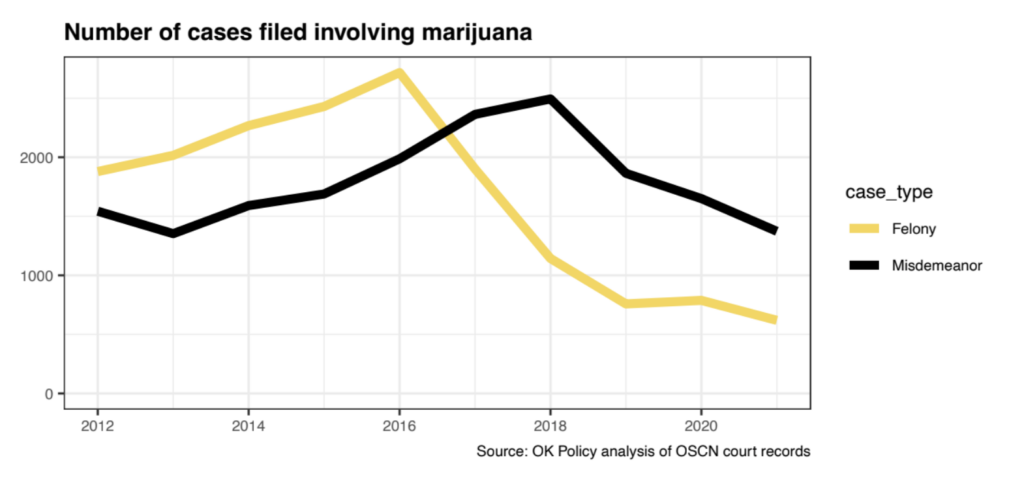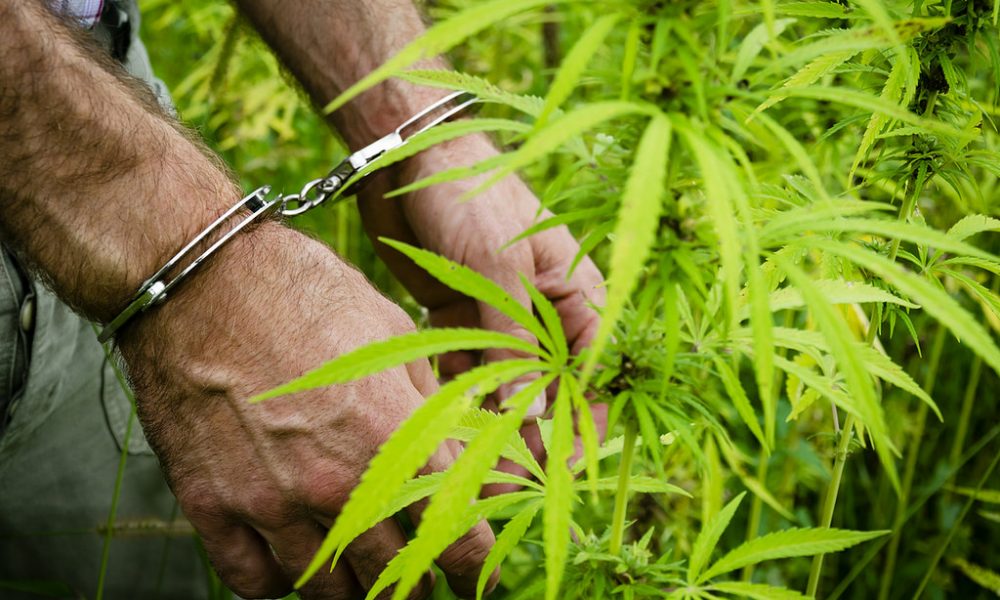As early voting begins this week on an Oklahoma marijuana legalization measure on Tuesday’s ballot, the campaign behind the initiative is promoting a new report detailing the costs of criminal prohibition and highlighting an endorsement from a former police chief.
The goal is to make the case to voters that prohibition hasn’t prevented cannabis use in Oklahoma but has instead taken tolls on individuals lives, families and futures.
Former Chief of Police, Stephen Mills asks #Oklahoma voters to support #SQ820, so law enforcement can prevent serious crime.
Minor #marijuana offenses waste resources, and the current system is broken. We deserve better, said Chief Mills. #YesOn820https://t.co/uEZKFja8Va
— Yes on 820 Campaign (@YesOn820) March 1, 2023
More than 4,500 people in the state are arrested annually for cannabis possession, according to the new report from the group Oklahomans for Criminal Justice Reform. And while the number of criminal cases filed in the state has dropped sharply since state voters legalized medical marijuana in 2018, thousands of misdemeanor and felony charges are still brought each year.
OK Justice Reform
What’s more, despite similar use rates across racial lines, Black men in the state are five times more likely to be arrested for cannabis possession than their white counterparts. Black men are also twice as likely to be sentenced on marijuana-based charges.
“Oklahoma’s law enforcement community is wasting its valuable time and resources on chasing down adults who use marijuana and charging them with petty offenses,” Damion Shade, the group’s executive director, said in a press release about the new report.
Those thousands of Oklahomans are mothers & fathers, daughters & sons, and trusted community members. By incarcerating them, we are tearing apart families, hurting our local economies, and forcing law enforcement to waste their time and resources that could be better directed /3
— OK Justice Reform (@OKJusticeReform) February 28, 2023
“In this case, it’s not marijuana that is the problem,” Shade said, “it’s our law enforcement response to it.”
On social media, the campaign for State Question 820, which would legalize cannabis for adults 21 and older, shared the report and called on voters to approve the ballot measure set for a special election next week. Early voting on SQ 820 begins in the state on Thursday.
Over 4500 Oklahomans are arrested annually for having small amounts of marijuana. They are forced to pay over $8.3 million in fines and fees. Police spend over 11,000 hours processing these arrests. End the waste. Vote #Yeson820 on March 7. https://t.co/DTRM97s5fa
— Yes on 820 Campaign (@YesOn820) February 28, 2023
The campaign also shared a new ad featuring the former chief of the Lindsay Police Department, Stephen Mills.
“I can tell you our current marijuana laws aren’t working,” he says in the ad. “Minor marijuana offenses take away time and resources from our police and courts. We should be focused on serious crime.”
The OK Justice Reform report found that more than 60,000 people in Oklahoma have either cannabis-related convictions or unexpunged dismissals on their records, the report found. If SQ 820 becomes law, those people could petition the court to clear the records.
Oklahomans also paid more than $8.3 million in fines and fees for cannabis possession, or about $1,859 per person, the report found.
Legalization, by comparison, is projected by advocates to bring the state more than $100 million in tax revenue annually, or about $434 million in tax revenue between 2024 and 2028. Legal cannabis products would be subject to an excise tax of 15 percent under SB 820.
Here’s what the cannabis legalization initiative would achieve:
The measure would allow adults 21 and older to purchase and possess up to one ounce of cannabis, grow up to six mature plants and six seedings for personal use. The current Oklahoma Medical Marijuana Authority would be responsible for regulating the program and issuing cannabis business licenses.
A 15 percent excise tax would be imposed on adult-use marijuana products, with revenue going to an “Oklahoma Marijuana Revenue Trust Fund.”
The funds would first cover the cost of administrating the program and the rest would be divided between municipalities where the sales occurred (10 percent), the State Judicial Revolving Fund (10 percent), the general fund (30 percent), public education grants (30 percent) and grants for programs involved in substance misuse treatment and prevention (20 percent).
People serving in prison for activity made legal under the measure could “file a petition for resentencing, reversal of conviction and dismissal of case, or modification of judgment and sentence.” Those who’ve already served their sentence for such a conviction could also petition the courts for expungement.
Already the state’s legalization of medical marijuana seems to have had a dampening effect on arrests and prosecutions. Since voters passed SQ 788, a 2018 medical marijuana measure, cannabis cases have fallen sharply. The number of people incarcerated on cannabis charges has also declined.
“Felony marijuana cases dropped 63% in three years after SQ 788, while misdemeanors dropped 34%,” the report says. “Still, an average of 2,200 criminal cases are filed each year with marijuana-related charges.”

OK Justice Reform
“The easiest way to eliminate this damage and societal harm,” said Shade at OK Justice Reform, “is to legalize marijuana for adults and tightly regulate it, as State Question 820 proposes to do.”
Advocates for SQ 820 launched TV ads and a door-knocking campaign last month to get out the vote ahead of next week’s special election.
“This is a unique election in that SQ 820 is the only thing on the ballot; there are no other candidates or campaigns,” Michelle Tilley, the campaign’s director, told Marijuana Moment at the time. “We know the majority of Oklahomans support SQ 820 and the legalization of recreational marijuana for adults over 21. What we don’t know is who will turn out to vote.”
OK Justice Reform has also published an explainer in support of the legalization proposal.
SQ 820 is the only one of three competing cannabis measures that advocates have tried in recent months to qualify for the ballot. Last month an advocate for the other two measures, State Questions 818 and 819, encouraged voters to put their support behind SQ 820.
The endorsement rankled other advocates, including at Oklahomans for Responsible Cannabis Action (ORCA), which worked on the competing state questions. ORCA and some other advocates have criticized SQ 820 over its allowance for out-of-state business funding and other provisions. Green told Marijuana Moment a year ago that he felt the New Approach PAC-backed initiative is “just the wrong approach for Oklahoma.”
Gov. Kevin Stitt (R), who called for next week’s special election, himself opposes adult-use legalization, although he did say last year that he thinks the federal government should end prohibition to “solve a lot of issues from all these different states” that have legalized cannabis. Stitt also said last year that he thought Oklahoma voters were misled into approving an earlier medical cannabis legalization initiative in 2018.
Washington Senate Votes To Legalize Interstate Marijuana Commerce
Read the full article here









